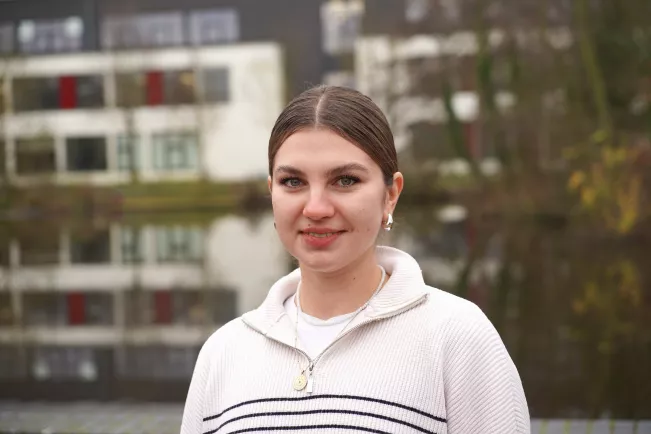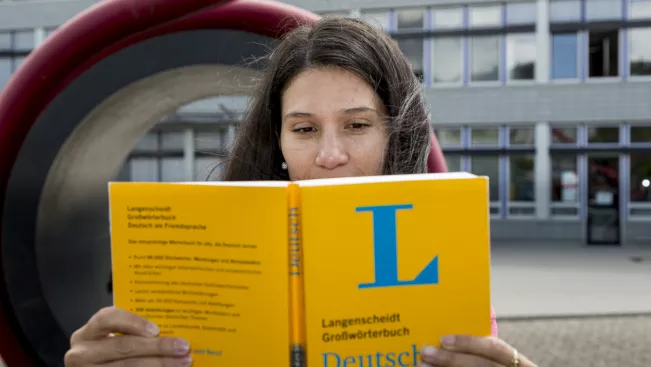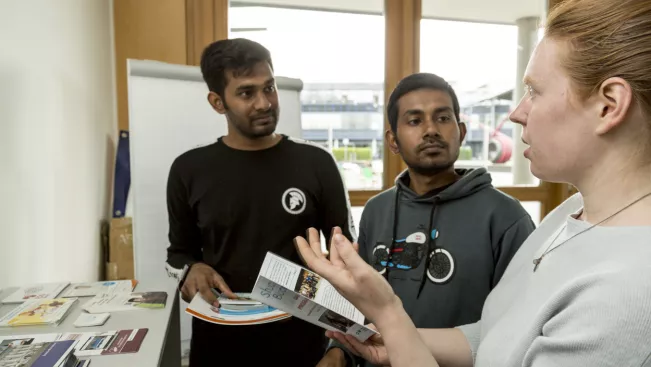International Office
Tetiana Myska: With courage and discipline to a place at university in Germany

Tetiana Myska has been through a tough time full of uncertainties: When Russia launched its war of aggression against Ukraine in February 2022, she had just started her marketing degree at the university in Kiev and planned to finally be able to switch to face-to-face teaching after the coronavirus period.
Instead, from 24 February, there was only one topic on television, the internet and social media: the war: "There was just fear and panic. Everyone wanted to get out of the city as quickly as possible," recalls Tetiana Myska. Together with her family, she decided to flee to western Ukraine - as far away as possible from the aggressor in the east. As all the roads were overcrowded, they made their way to the railway station, where chaos awaited them: "Everything was full of people and we couldn't even see when a train was coming or where it was going. There were no timetables," says Tetiana Myska. After a twelve-hour journey standing still, the refugees arrived in western Ukraine - 300 kilometres away from their actual destination. However, the initial relief did not last long: "In the first few days, we thought the war would only last two weeks at most and that our soldiers would quickly manage to fend off the attack," recalls Tetiana Myska. But things turned out differently and the young woman decided to leave Ukraine permanently.
Going with the flow
Fleeing is one thing, she says today, but actually emigrating and leaving your whole life behind is something else. Many people can't imagine that. Many of her friends and acquaintances also stayed in their home country, she says. They told her that they had no plans for the future. they call it 'going with the flow': seeing what happens every day and reacting to it. However, this was not an option for the young Ukrainian woman in 2022. Together with a friend, she fled to Germany via Poland: "It was my teenage dream to study in Europe or abroad in general, to travel and see something of the world," she says. This ultimately gave her the strength to see the difficult situation as an opportunity.
Through social networks and word of mouth, the women finally ended up in a refugee centre in Weilerswist, where a dedicated employee supported them with the necessary bureaucracy and helped them to start their first integration language course at the Youth Migration Service: "At the time, I said 'Okay, I'm in Germany now and I have to take this chance, because I won't have as many opportunities in Ukraine in the near future'," she recalls. Within a year, she managed to reach language level B1 without any prior knowledge and also learnt a lot about German culture, history and politics.
Language courses for starting a degree
In order to be able to start a degree course in Germany, non-native speakers must prove that they can understand demanding, longer texts and express themselves in detail on complex topics. This is where the "NRWege ins Studium" programme comes in, which supports refugees who want to study at university. In the language course at TH Köln, Tetiana Myska achieved the required language level C1. She also completed an intensive English course at H-BRS, financed in part by the H-BRS emergency fund, in which the university collects donations for refugees from Ukraine and the H-BRS partner university in Chernihiv.
Tetiana Myska has been studying business psychology at the Rheinbach campus since the winter semester. Her language skills are now so good that she can converse fluently in German. Nevertheless, as a non-native speaker, she has to remain very attentive at all times so as not to miss anything - especially when a lot of technical terms are used: "If I look out of the window for a moment, I no longer understand what it's about. Then I have to go through everything again at home and explain the terms to myself bit by bit," she says. She also uses the AI chatbot chatGPT for this academic vocabulary training.
In order to be able to devote herself fully to her studies and further language training, H-BRS is currently supporting Tetiana Myska in the programme "Future Ukraine" with a scholarship. After graduating, the student can imagine a career in human resources management, market research or as a coach. After years of uncertainty, she now has prospects again.
Contact

Location
Location
Sankt Augustin
Address
Grantham-Allee 20
53757 Sankt Augustin

